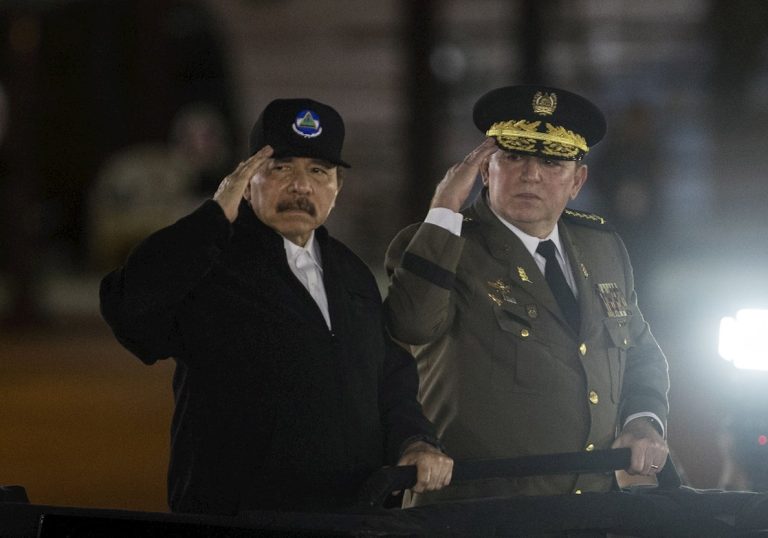7 de agosto 2020

Children of Exile: The Births “Sowing Hope” in the Camp of Nicaraguan Farmers

PUBLICIDAD 1M
PUBLICIDAD 4D
PUBLICIDAD 5D
“Ortega will decide the rules” for the next elections “in early 2021,” probably under Joe Biden’s administration, the EIU estimates

The sanctions of the United States Department of the Treasury against officials and relatives of President Daniel Ortega, have not achieved their objective: to force the Sandinista strongman to promote reforms that pave the way for free elections and the restoration of democracy, according to an analysis by The Economist Intelligence Unit (EIU). The report also notes that a sanction to the Nicaraguan Army, is one of the “last cards” of the US President, Donald Trump, against the Ortega regime.
“The (Nicaraguan) presidential couple have obstinately resisted” US sanctions, and “with the chances of Trump’s reelection declining, they have little incentive to make concessions to a leader possibly on his way out,” highlights EIU, owned by the British group The Economist.
The EIU recalls that since December 2017, 22 officials and operators of the regime have been sanctioned, including the First Lady and Vice President, Rosario Murillo, and three sons of the presidential couple: Laureano, Rafael and Juan Carlos.
“Officials of the US State Department regularly affirm that the sanctions will continue until the Ortega Government accepts the conditions for the restoration of democratic freedom and fair elections. However, having resisted thus far, it is unlikely that the Ortega Administration will yield to these pressures, while Trump’s time in office seems to be running out,” concluded the firm, which specializes in providing analysis and forecasts on countries.
The United States will hold presidential elections in November, and polls currently give democrat Joe Biden, Trump’s opponent, an advantage in voting preferences.
The prestigious publication does not rule out that the US President will sanction the Nicaraguan Army, as “one of the few cards that Trump has left to play before the US elections in November.”
It argues that “the United States’ sanctions policy towards Nicaragua is largely driven by the desire to win over Latino voters in Florida—where Trump is behind (Biden). It is not inconceivable that a desperate US President decides to raise the ante against the Ortega administration in the coming months.”
The EIU also recalls recently General Julio Cesar Aviles, Head of the Nicaraguan Army, rejected the US arguments to sanction him. The high military officer was sanctioned on May 22 —together with Minister of Finance, Ivan Acosta Montalvan—, for “supporting the corrupt Ortega regime” and “refusing” to dismantle the paramilitary forces during and after the civic 2018 uprising.
“The decision of the Treasury Department is “interventionist,” said Aviles, during an activity of the Military Council in mid-July.
For the British firm, “besides expressing loyalty to the president, Aviles’ unusual public position may have been intended to send a message about how the military would react if the United States issued institutional sanctions against it.” Just as it did against the National Police, last March.
The publication describes as a “defiance” of the regime, the fact that during the central event of the 41st anniversary of the revolution, on July 19, the caudillo was accompanied at the main stage by seven sanctioned personalities.
Ortega was flanked by his wife Murillo and General Aviles. He was also accompanied by Minister Acosta, as well as: National Police Director, First Commissioner Francisco Diaz; the President of the National Assembly, Gustavo Porras; the Director of the Nicaraguan Social Security Institute (INSS), Roberto Lopez; and the former Minister of Health, Sonia Castro. All sanctioned for human rights violations and corruption.
Along with the sanctions of individuals, institutions and companies “considered key to finance the regime through illicit activities,” the United States “has quietly used its influence on the World Bank (WB) and the Inter-American Development Bank (IDB) to deny the Nicaraguan administration access to new funds.” However, “although all these policies undoubtedly made life more difficult for the regime, until now they have not managed to achieve their declared purpose,” according to the British firm.
The EIU believes that the Sandinista leader hopes to reach a political truce with a Biden government; however, it clarifies that they continue “to be skeptical about the prospects of a significant reversal of sanctions” under the administration of former vice president Biden.
The prestigious British firm believes that the Ortega regime “will decide the rules” for the next Nicaraguan elections, scheduled for November 2021, “in early 2021,” when a Biden Administration is likely to have come to power” in the United States.
“The presidential couple apparently hopes to achieve a reversal of some United States sanctions, in exchange for concessions on electoral guidelines,” affirms the publication, which insists on its “doubts” about a possible bilateral negotiation with a Biden government.
“The efforts of the United States to promote democratization in Nicaragua have generally enjoyed bipartisan support in that country, and this is likely to continue unchanged, even under a Biden Administration,” highlights EIU.
On the economic front, the publication maintains that the economic recession, which started as a result of a political crisis in 2018, “will deepen significantly during 2020-2021, as a result of the coronavirus outbreak.”
Despite maintaining that forecast, economic activity between May and July made them change their forecast for the end of the year. “The result suggests a shallower contraction in the second quarter than the one we had pointed out.”
The firm projects that for this year Nicaragua’s Gross Domestic Product (GDP) will contract by -7.5%; after that at the beginning of last July it had forecasted a fall of -8.2%. “However, the downside risks of our forecast remain substantial given the spread of the coronavirus outbreak locally.”
Archivado como:
PUBLICIDAD 3M
Confidencial es un diario digital nicaragüense, de formato multimedia, fundado por Carlos F. Chamorro en junio de 1996.
PUBLICIDAD 3D